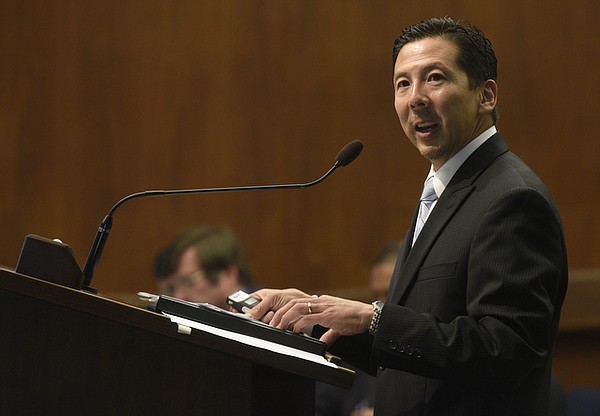Public Health Director Dr. Takashi Wada Announces January Departure
Taking CenCal Health's Newly Created Position of Deputy Medical Director

County Public Health Director Dr. Takashi Wada has spent the better part of the past six years dodging the political, fiscal, and bureaucratic equivalents of incoming meteors; this week, he announced he is stepping down in January to take a newly created post as deputy medical director of CenCal Health, which administers health insurance for 120,000 low-income Santa Barbara residents.
News of Wada’s imminent departure came as a surprise to some denizens of the fourth floor of the County Administration building, home to county supervisors and executive administrators. Only earlier this week did supervisors first officially hear Wada — highly regarded for the competence and quiet calm with which he addressed his department’s many challenges — was even exploring other job options. Wada’s departure comes at the same time two longtime supervisors — Salud Carbajal and Doreen Farr — are also about to step down, and two new ones — Das Williams and Joan Hartmann — are about to be sworn in. Wada denied the changing of the supervisorial guard influenced his decision. Instead, he said, the CenCal post provided a better opportunity to put his medical and clinical training to use.
As CenCal’s new deputy medical director, Wada will play a major role addressing issues of clinical care quality, care efficiency, and provider utilization — wonky labels that define how much care is available to low-income residents of both Santa Barbara and San Luis Obispo counties, with what kind of restrictions, and at what cost.
As a public figure, Wada was accessible, deliberate, and careful. As a department head, he was broadly respected and liked and became the supervisors’ go-to guy. When the federal government appeared poised to cut critical funding to the county’s terminally dysfunctional Department of Alcohol, Drug and Mental Health Services several years ago, the supervisors asked Wada to take over and stabilize things. For nearly two years, Wada ran two of the county’s largest, most bureaucratically complicated departments; they also happened to serve some of the county’s most vulnerable and economically fragile populations.
Wada took over at Public Health just as the fiscal aftershocks of the recession struck; his department lost 75 full-time equivalent positions. The implementation of the Affordable Care Act (ACA) also took a toll, costing his department $8 million in state revenues. Public Health would eventually recoup those funds by aggressively enrolling many new clients into Medi-Cal, the federal insurance program targeting low-income citizens. Public Health saw its patient roles increase by 67 percent in response to the ACA. Wada’s new employer is the entity that administers Medi-Cal payments in Santa Barbara and San Luis Obispo counties.
For all Wada’s understated resilience, not even he could calm the ferocious controversies surrounding Animal Services, a division of Public Health, and the focus of sustained and passionate bickering between staff and some of the volunteers upon whom the division relies for funding and manual assistance.
Wada is taking a new job that pays about $260,000 a year in salary, $20,00 more than his current post. It should consume less time and be considerably less draining, but given that CenCal is responsible for the lion’s share of ACA enrollees in the two counties — and the Trump administration has vowed to repeal the ACA — the new post comes with challenging uncertainties as well.
Wada expressed gratitude to the county supervisors and executives with whom he’s worked. He noted that his department has just published a comprehensive health needs assessment that will provide the basis for any improvement plans to come. Aside from addressing oil spills and fires, Wada’s department has also dealt with such serious health scares as the Zikka virus, Ebola, and Hepatitis C. In addition, Public Health has just embarked on a new plan to provide long-term housing to homeless patients who heavily rely upon County Public Health for medical services. That initiative is just getting started.
To date, no plans have been finalized to replace Wada in the short term, but he expressed confidence that Public Health administrators will handle the transition. “We have great senior leadership,” he said.



